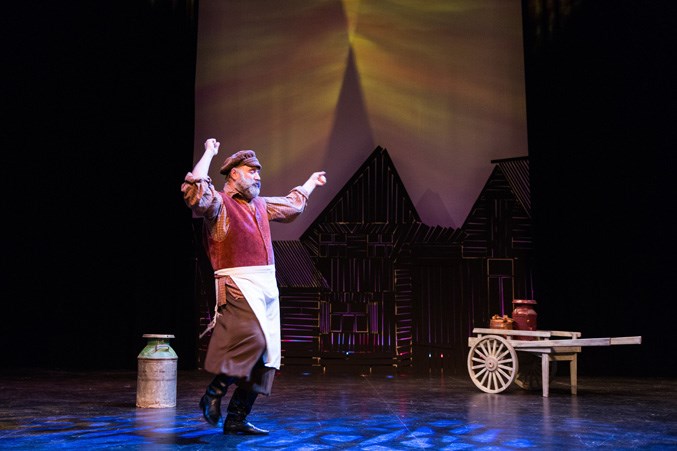Fiddler on the Roof continues to inspire in much the same way as its 1964 Broadway opening.
REVIEW
Fiddler on the Roof
Runs until Dec. 30
Festival Place
100 Festival Way
Sherwood Park
Tickets: Visit https://festivalplace.ab.ca/view/shows/id/1002
The shaky state of the world presents us with yet another reason to appreciate
Fiddler on the Roof now playing at Sherwood Park's Festival Place until Dec. 30.
Revived by Festival Players, this much-loved 1964 musical comedy about the break-up of a family and a community strikes at the heart and appears prophetic of 21st century politics.
Director Shelley Tookey and conductor Michael Clark's first-rate community theatre production, which opened Friday, salutes the show's vivacity and high-spirits embodied in the main character of Tevye, a Jewish dairyman living in a shtetl in early 20th century Ukraine.
He is a rock within his family of five daughters and an influential spokesman for the villagers. More than anything he is a philosopher-milkman dispensing time-honoured proverbs between deliveries as well as quipping and tossing a few zingers at an unresponsive God.
Tevye's daughters are of marriageable age and there is serious discussion about finding husbands. However, the girls are balking at the village matchmaker searching for husbands. The opening number,
Tradition, defines the musical's theme, the tension between upholding principles of the past and accepting the progression of new ideas.
During the three-hour musical, the multi-coloured, lush scenes move toward to the heart-wrenching finale where Anatevka, an entire Jewish village is dismantled and villagers walk away to uncertain destinies in the wake of a looming pogrom. Somehow it was impossible not to think of terrified families escaping violence in the Middle East or the Rohingya fleeing death in Myanmar.
Yes, it's a powerful story with multiple layers of tensions and moods. But the score by Jerry Bock (music) and Sheldon Harnick (lyrics) carries a magic of its own. It plumbs your soul and is impossible to forget. Songs of celebration such as
If I Were a Rich Man or
The Bottle Dance are invigorating and spirited whereas love songs such as
Sunrise, Sunset and
Do You Love Me simmer with tenderness and loss.
Tevye is in virtually every scene and actor Brian Bast carries the weighty role with humour and dignity. Bast has a way of conveying his folksy character's indomitable will and unshakable faith hidden beneath a patina of self-deprecating humour.
There are many Jewish jokes in the script and Bast delivers them in a natural, unforced way that simply adds strength to his performance. And his rich bass-baritone anchors many of the songs while richly conveying the shifts in mood.
Jane Leske as Tevye's wife Golde is a singer who fills the bill but occasionally swerves away from a Yiddish Ukrainian accent. Leske's Golde has aged before her time and she is always steeped in work or worry, and clearly gets frustrated with her ambivalent husband.
Genie Kwon as Tzietel, the oldest daughter and the first of marriageable age, has a gorgeous soprano voice and reveals a stubborn romanticism in choosing her husband, Motel the poor tailor.
After some initial friction, Hodel (Josephine Herbert), the second oldest sister, comes to appreciate Perchik (Maxim Bahri), a fiery radical banished to Siberia. And Chava, (Lisa Kotelniski), the family bookworm, creates further fissures by marrying a gentile.
By the end of the play all these lively characters have packed their meagre belongs on a cart and walked away to an unknown destiny where today they could be an image or a story in any newspaper.




